Unit 5 What are the shirts made of? SectionA(3a-3c)课件 (共24张PPT)
文档属性
| 名称 | Unit 5 What are the shirts made of? SectionA(3a-3c)课件 (共24张PPT) | 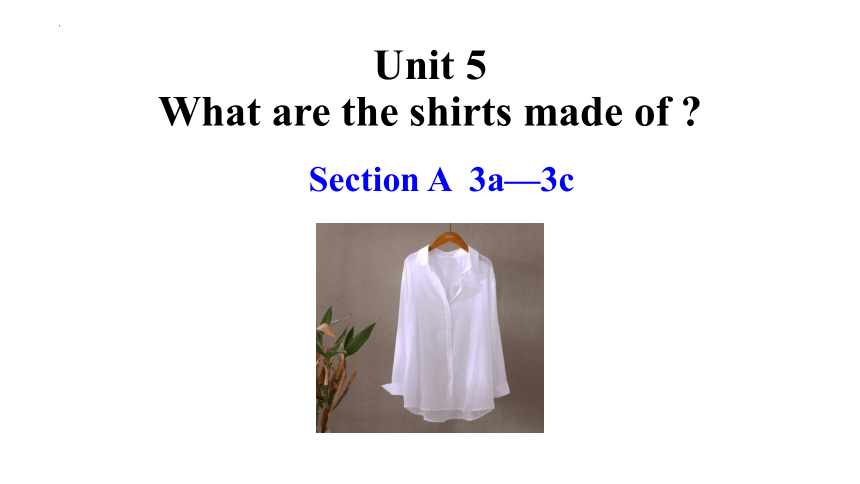 | |
| 格式 | zip | ||
| 文件大小 | 6.8MB | ||
| 资源类型 | 教案 | ||
| 版本资源 | 人教新目标(Go for it)版 | ||
| 科目 | 英语 | ||
| 更新时间 | 2022-09-25 18:42:45 | ||
图片预览

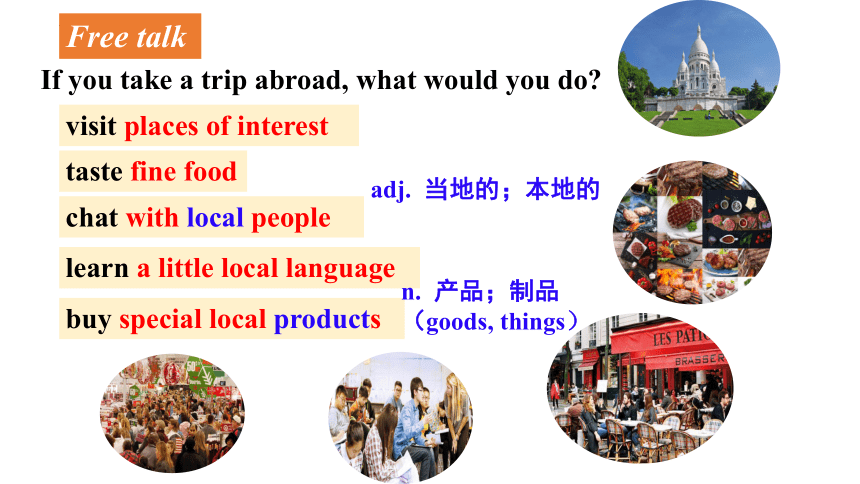
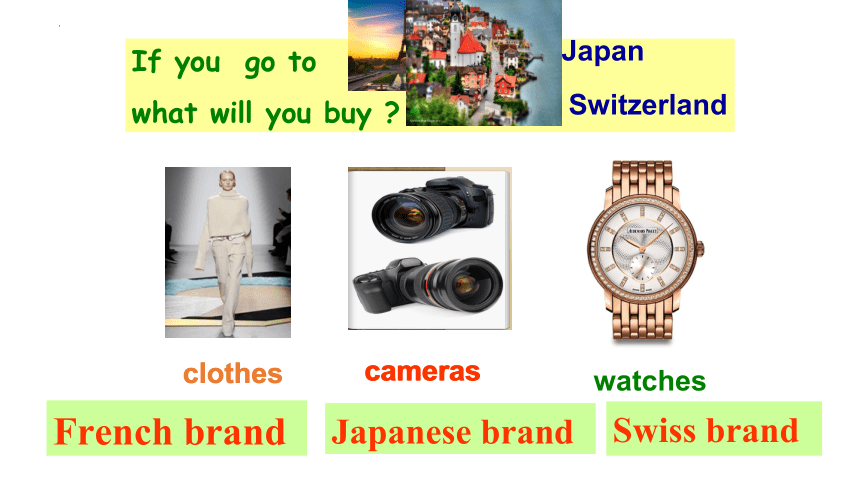
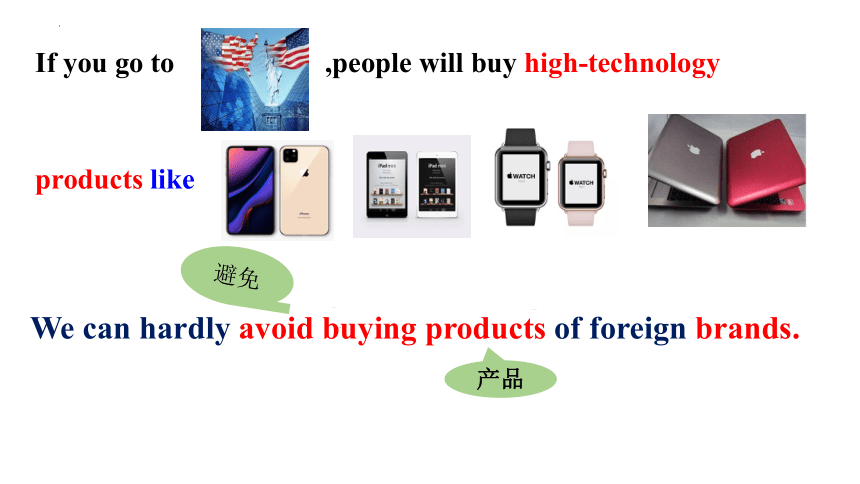
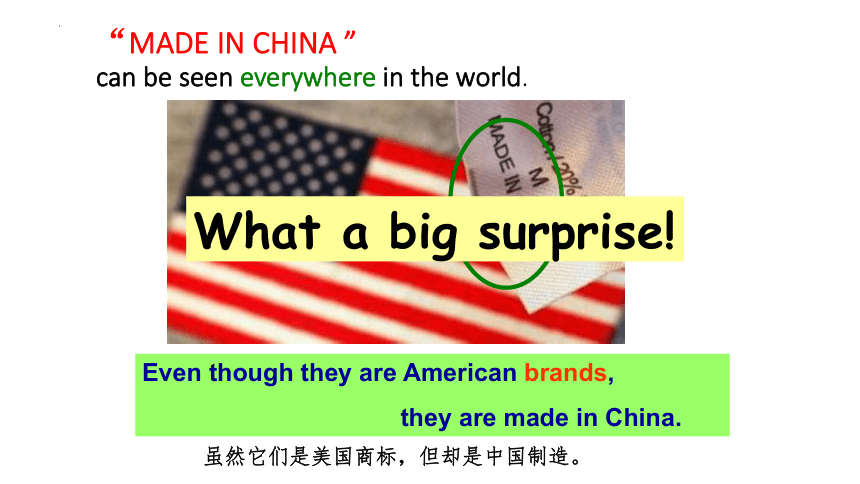
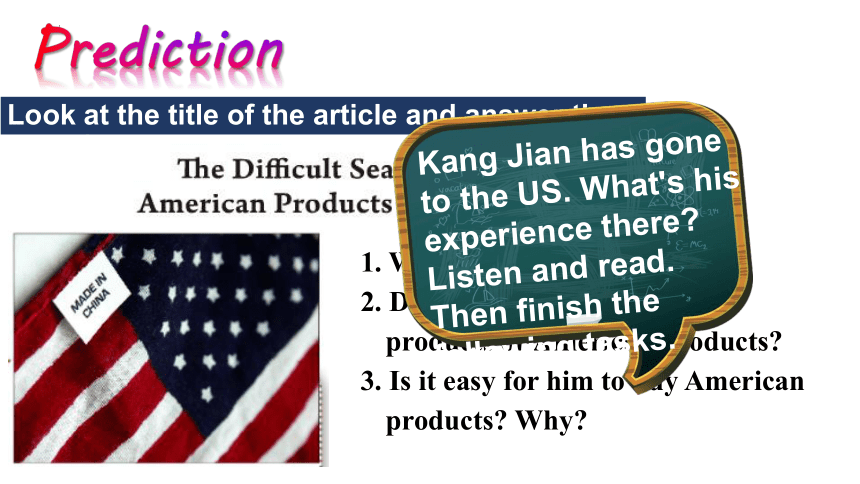
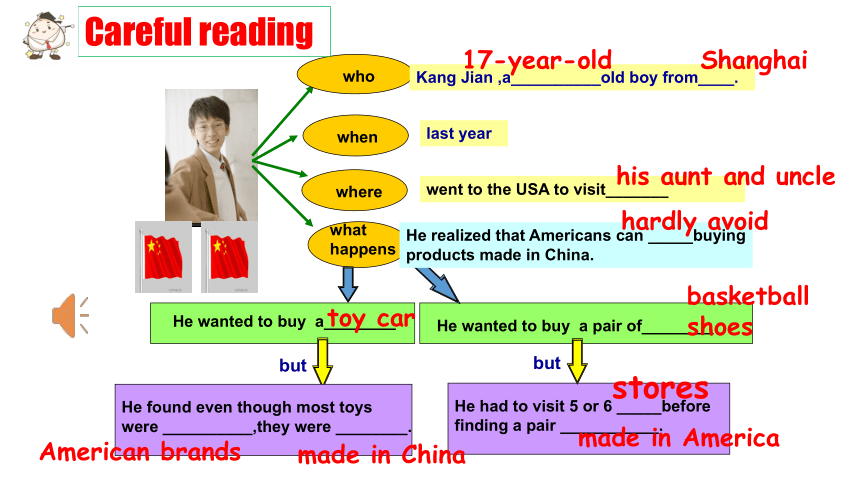
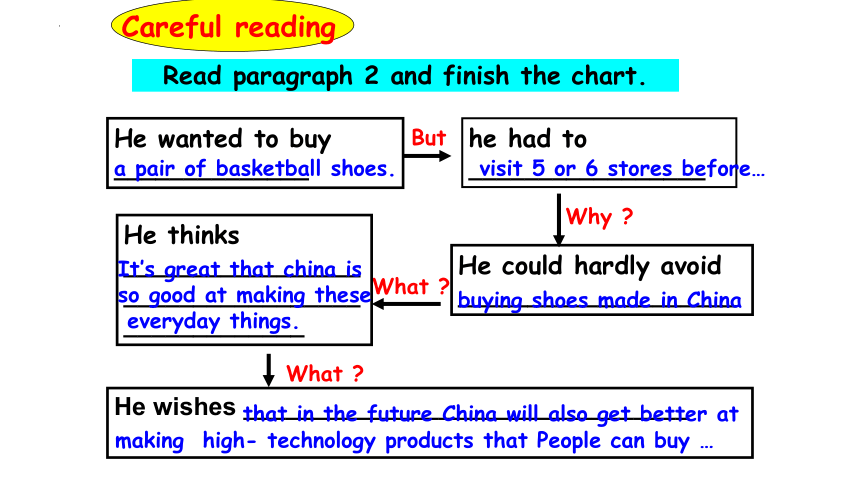
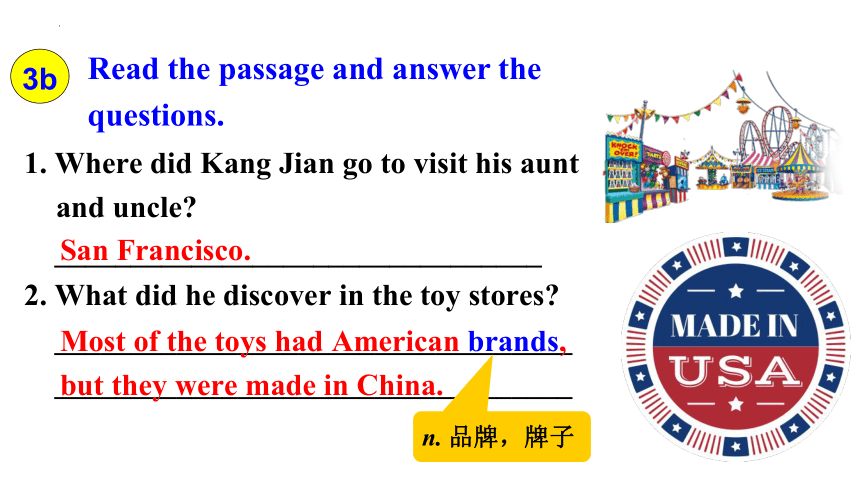
文档简介
(共24张PPT)
Unit 5
What are the shirts made of
Section A 3a—3c
Free talk
visit places of interest
taste fine food
chat with local people
adj. 当地的;本地的
learn a little local language
buy special local products
n. 产品;制品(goods, things)
If you take a trip abroad, what would you do
If you go to
what will you buy
France,
clothes
cameras
watches
Japan
Switzerland
clothes
cameras
French brand
Swiss brand
Japanese brand
If you go to ,people will buy high-technology
products like
We can hardly avoid buying products of foreign brands.
———
避免
————
[ v d]
产品
“MADE IN CHINA ”
can be seen everywhere in the world.
Even though they are American brands,
they are made in China.
虽然它们是美国商标,但却是中国制造。
What a big surprise!
1. Where is the tourist
2. Does he want to buy Chinese products or American products
3. Is it easy for him to buy American products Why
Prediction
Look at the title of the article and answer the questions.
Kang Jian has gone to the US. What's his experience there Listen and read. Then finish the following tasks.
who
when
what happens
Kang Jian ,a__________old boy from____.
last year
where
went to the USA to visit_______
He wanted to buy a________
He found even though most toys were __________,they were ________.
He had to visit 5 or 6 _____before finding a pair ___________.
He wanted to buy a pair of________
but
but
He realized that Americans can _____buying products made in China.
Careful reading
his aunt and uncle
hardly avoid
toy car
made in China
American brands
basketball shoes
stores
made in America
17-year-old
Shanghai
He wanted to buy
______________
a pair of basketball shoes.
he had to _________________
visit 5 or 6 stores before…
But
Why
He could hardly avoid
____________________
buying shoes made in China
What
He thinks _______________________________________________
It’s great that china is
so good at making these
everyday things.
He wishes ________________________________
What
that in the future China will also get better at
making high- technology products that People can buy …
Read paragraph 2 and finish the chart.
Careful reading
Read the passage and answer the questions.
1. Where did Kang Jian go to visit his aunt and uncle
________________________________
2. What did he discover in the toy stores
__________________________________
__________________________________
Most of the toys had American brands, but they were made in China.
San Francisco.
n. 品牌,牌子
3b
3. Why did he have to visit many stores before buying a pair of basketball shoes
____________________________________________________
____________________________________________________
4. What did he realize after his shopping experiences
___________________________________________________
________________________________________________
He realized that Americans could hardly avoid buying products that were made in China.
Because he wanted to look for a pair of basketball shoes that were made in America.
v. 避免, 回避
5. Why do you think so many products in America are made in China
__________________________________________________
How do you feel about this
Production costs are lower and there is a big labor market.
Read the passage again and write what the words in bold refer to.
Reading strategy(阅读策略)
—careful reading (精读)
A camera, some beautiful clothes, a watch
Japan, France, Switzerland
1.No matter what you may buy, you might probably think those products were made in those countries.
2.He found it interesting that so many products
in the local shops were made in China.
it: so many products in the local shops were made in China
3. I wanted to buy a toy car for my cousin, but even though most of the toys had American brands, they were made in China.
they:
most of the toys
Pay attention to the following circled parts.
这些句子使用的语态称为被动语态。
基本句式如下:be动词 +V-ed
The Difficult Search for
American Products in the US
1 If you go to another country, what kinds of things would you buy Would you buy a camera in Japan, some beautiful clothes in France, or a watch in Switzerland No matter what you may buy, you might think those products were made in those countries. However,
寻找
“另一个国家” another+单数名词
或者;还是
无论什么
you could be wrong. Kang Jian is a 17-year-old student from Shanghai. Last year he went to visit his aunt and uncle in San Francisco. He found it interesting that so many products in the local shops were made in China. “I wanted to buy a toy car for my cousin, but even though most of the toys were American brands, they were made in China.”
可能错了
一个17岁大的学生
旧金山
主语
谓
形宾
宾补
真宾
buy sth. for sb.
即使;尽管
2 Toys are not the only things made in China. “I wanted to buy a pair of basketball shoes,” he explains. “But I had to visit five or six stores before finding a pair made in America!” He realized that Americans can hardly avoid buying products made in China. “In fact,” he continues, “there are many other things there made in China —
explain sth. to sb.向某人解释某事
before doing sth.在做某事之前
引导宾从
hardly adv.几乎不
avoid doing sth.避免做某事
实际上
继续
footballs, handbags, pet food, mobile phones. Even American flags are made in China!” Kang Jian thinks it’s great that China is so good at making these everyday things. However, he hopes that in the future China will also get better at making high-technology products that people can buy in all parts of the world.
移动电话
宾语从句
形主
真主
日常物品
引导宾从
变得更擅长
高科技产品
引导定语从句
Language points
1. No matter what you may buy, you might think those products were made in those countries.
无论你买什么,你可能都会认为那些产品一定就是那个国家制造的。
no matter
意为“不论…;无论…;不管…”。
常与what, where, when, how等疑问词连用
表示“无论……;不管……”。
no matter+疑问词 = 疑问词+-ever
【活学活用】
1) 无论你是谁,必须遵守规则。
_____________________________, you must follow the rules.
2) 无论发生什么,请保持冷静。
Please keep calm, _______________________________.
3) 无论生活可能会多么艰苦,决不要放弃希望。
_____________________________ your life may be, never give up your hope.
4) Cindy很爱读书,无论她去哪儿,总是随身带着一本书。
Cindy is a book lover. _______________________________, she always has a book with her.
No matter how/However difficult
No matter who/Whoever you are
no matter what / whatever happens
No matter where/Wherever she goes
2. He realized that Americans can hardly avoid buying products made in China.
他意识到美国人想不买中国产品几乎不可能。
avoid
意为“回避;避开;躲避”。
avoid + n./ pron./ V-ing表示“避免;逃避;回避.......”。
【活学活用】
他几乎不能避免整天地玩电脑游戏。
________________________________________________.
He can hardly avoid playing computer games all day.
3.Kang Jian thinks it's great that China is so good at making these everyday things.
everyday是every和day构成的合成词。意为“每日的; 每天的; 日常的; 平日的”。everyday是形容词, 仅用在名词前作定语,不能单独使用。everyday life 日常生活 everyday activities 日常活动
every day是副词短语,意为“每天”, 相当于each day, 用作时间状语。
【活学活用】
1) 天气影响着每个人的日常生活。 _____________________________
2) 老师让我们每天都要读英语书。 _______________________________.
The weather influences everyone's everyday life.
The teacher asked us to read English books every day.
1.翻译下列词组。
1.无论什么 _____________
2.当地商店 ________________
3.即使 ____________
4.日常用品 ______________
5.中国造的产品 ____________________
6.他的购物经历 ______________________
7.美国品牌 ______________
8. high technology products____________
no matter what
the local shops
even though
everyday things
products made in China
his shopping experiences
American brands
高科技产品
朗读并记忆下列短语
2. 根据汉语意思及括号内所给提示语,将下列句子翻译成英语。
1. 尽管昨天天气炎热,Dale还是得外出。 (even though)
_____________________________________________
_____________________________________________
2. 孩子们应该避免长时间看电视。 (avoid)
___________________________________________
Even though it was hot yesterday, Dale had to go out.
/ Dale had to go out even though it was hot yesterday.
Children should avoid watching TV for a long time.
3. 无论遇到什么困难,Gina都不会放弃她的梦想。 (no matter what)
___________________________________________________________________________________________________
Gina won’t give up her dream no matter what difficulties she meets. / No matter what difficulties Gina meets, she won’t give up her dream.
4. Greg对这个消息一点也不伤心,你可能觉得很奇怪。 (find it+adj.+that)
____________________________________________________
You may find it strange that Greg isn’t sad about the news at all.
Homework
1. Review the new words and expressions
you've learned today.
2. Read the articles in Learning English.
3. Finish the exercises in Learning English.
4. Preview Grammar Focus on page 36.
Unit 5
What are the shirts made of
Section A 3a—3c
Free talk
visit places of interest
taste fine food
chat with local people
adj. 当地的;本地的
learn a little local language
buy special local products
n. 产品;制品(goods, things)
If you take a trip abroad, what would you do
If you go to
what will you buy
France,
clothes
cameras
watches
Japan
Switzerland
clothes
cameras
French brand
Swiss brand
Japanese brand
If you go to ,people will buy high-technology
products like
We can hardly avoid buying products of foreign brands.
———
避免
————
[ v d]
产品
“MADE IN CHINA ”
can be seen everywhere in the world.
Even though they are American brands,
they are made in China.
虽然它们是美国商标,但却是中国制造。
What a big surprise!
1. Where is the tourist
2. Does he want to buy Chinese products or American products
3. Is it easy for him to buy American products Why
Prediction
Look at the title of the article and answer the questions.
Kang Jian has gone to the US. What's his experience there Listen and read. Then finish the following tasks.
who
when
what happens
Kang Jian ,a__________old boy from____.
last year
where
went to the USA to visit_______
He wanted to buy a________
He found even though most toys were __________,they were ________.
He had to visit 5 or 6 _____before finding a pair ___________.
He wanted to buy a pair of________
but
but
He realized that Americans can _____buying products made in China.
Careful reading
his aunt and uncle
hardly avoid
toy car
made in China
American brands
basketball shoes
stores
made in America
17-year-old
Shanghai
He wanted to buy
______________
a pair of basketball shoes.
he had to _________________
visit 5 or 6 stores before…
But
Why
He could hardly avoid
____________________
buying shoes made in China
What
He thinks _______________________________________________
It’s great that china is
so good at making these
everyday things.
He wishes ________________________________
What
that in the future China will also get better at
making high- technology products that People can buy …
Read paragraph 2 and finish the chart.
Careful reading
Read the passage and answer the questions.
1. Where did Kang Jian go to visit his aunt and uncle
________________________________
2. What did he discover in the toy stores
__________________________________
__________________________________
Most of the toys had American brands, but they were made in China.
San Francisco.
n. 品牌,牌子
3b
3. Why did he have to visit many stores before buying a pair of basketball shoes
____________________________________________________
____________________________________________________
4. What did he realize after his shopping experiences
___________________________________________________
________________________________________________
He realized that Americans could hardly avoid buying products that were made in China.
Because he wanted to look for a pair of basketball shoes that were made in America.
v. 避免, 回避
5. Why do you think so many products in America are made in China
__________________________________________________
How do you feel about this
Production costs are lower and there is a big labor market.
Read the passage again and write what the words in bold refer to.
Reading strategy(阅读策略)
—careful reading (精读)
A camera, some beautiful clothes, a watch
Japan, France, Switzerland
1.No matter what you may buy, you might probably think those products were made in those countries.
2.He found it interesting that so many products
in the local shops were made in China.
it: so many products in the local shops were made in China
3. I wanted to buy a toy car for my cousin, but even though most of the toys had American brands, they were made in China.
they:
most of the toys
Pay attention to the following circled parts.
这些句子使用的语态称为被动语态。
基本句式如下:be动词 +V-ed
The Difficult Search for
American Products in the US
1 If you go to another country, what kinds of things would you buy Would you buy a camera in Japan, some beautiful clothes in France, or a watch in Switzerland No matter what you may buy, you might think those products were made in those countries. However,
寻找
“另一个国家” another+单数名词
或者;还是
无论什么
you could be wrong. Kang Jian is a 17-year-old student from Shanghai. Last year he went to visit his aunt and uncle in San Francisco. He found it interesting that so many products in the local shops were made in China. “I wanted to buy a toy car for my cousin, but even though most of the toys were American brands, they were made in China.”
可能错了
一个17岁大的学生
旧金山
主语
谓
形宾
宾补
真宾
buy sth. for sb.
即使;尽管
2 Toys are not the only things made in China. “I wanted to buy a pair of basketball shoes,” he explains. “But I had to visit five or six stores before finding a pair made in America!” He realized that Americans can hardly avoid buying products made in China. “In fact,” he continues, “there are many other things there made in China —
explain sth. to sb.向某人解释某事
before doing sth.在做某事之前
引导宾从
hardly adv.几乎不
avoid doing sth.避免做某事
实际上
继续
footballs, handbags, pet food, mobile phones. Even American flags are made in China!” Kang Jian thinks it’s great that China is so good at making these everyday things. However, he hopes that in the future China will also get better at making high-technology products that people can buy in all parts of the world.
移动电话
宾语从句
形主
真主
日常物品
引导宾从
变得更擅长
高科技产品
引导定语从句
Language points
1. No matter what you may buy, you might think those products were made in those countries.
无论你买什么,你可能都会认为那些产品一定就是那个国家制造的。
no matter
意为“不论…;无论…;不管…”。
常与what, where, when, how等疑问词连用
表示“无论……;不管……”。
no matter+疑问词 = 疑问词+-ever
【活学活用】
1) 无论你是谁,必须遵守规则。
_____________________________, you must follow the rules.
2) 无论发生什么,请保持冷静。
Please keep calm, _______________________________.
3) 无论生活可能会多么艰苦,决不要放弃希望。
_____________________________ your life may be, never give up your hope.
4) Cindy很爱读书,无论她去哪儿,总是随身带着一本书。
Cindy is a book lover. _______________________________, she always has a book with her.
No matter how/However difficult
No matter who/Whoever you are
no matter what / whatever happens
No matter where/Wherever she goes
2. He realized that Americans can hardly avoid buying products made in China.
他意识到美国人想不买中国产品几乎不可能。
avoid
意为“回避;避开;躲避”。
avoid + n./ pron./ V-ing表示“避免;逃避;回避.......”。
【活学活用】
他几乎不能避免整天地玩电脑游戏。
________________________________________________.
He can hardly avoid playing computer games all day.
3.Kang Jian thinks it's great that China is so good at making these everyday things.
everyday是every和day构成的合成词。意为“每日的; 每天的; 日常的; 平日的”。everyday是形容词, 仅用在名词前作定语,不能单独使用。everyday life 日常生活 everyday activities 日常活动
every day是副词短语,意为“每天”, 相当于each day, 用作时间状语。
【活学活用】
1) 天气影响着每个人的日常生活。 _____________________________
2) 老师让我们每天都要读英语书。 _______________________________.
The weather influences everyone's everyday life.
The teacher asked us to read English books every day.
1.翻译下列词组。
1.无论什么 _____________
2.当地商店 ________________
3.即使 ____________
4.日常用品 ______________
5.中国造的产品 ____________________
6.他的购物经历 ______________________
7.美国品牌 ______________
8. high technology products____________
no matter what
the local shops
even though
everyday things
products made in China
his shopping experiences
American brands
高科技产品
朗读并记忆下列短语
2. 根据汉语意思及括号内所给提示语,将下列句子翻译成英语。
1. 尽管昨天天气炎热,Dale还是得外出。 (even though)
_____________________________________________
_____________________________________________
2. 孩子们应该避免长时间看电视。 (avoid)
___________________________________________
Even though it was hot yesterday, Dale had to go out.
/ Dale had to go out even though it was hot yesterday.
Children should avoid watching TV for a long time.
3. 无论遇到什么困难,Gina都不会放弃她的梦想。 (no matter what)
___________________________________________________________________________________________________
Gina won’t give up her dream no matter what difficulties she meets. / No matter what difficulties Gina meets, she won’t give up her dream.
4. Greg对这个消息一点也不伤心,你可能觉得很奇怪。 (find it+adj.+that)
____________________________________________________
You may find it strange that Greg isn’t sad about the news at all.
Homework
1. Review the new words and expressions
you've learned today.
2. Read the articles in Learning English.
3. Finish the exercises in Learning English.
4. Preview Grammar Focus on page 36.
同课章节目录
- Unit 1 How can we become good learners.
- Section A
- Section B
- Unit 2 I think that mooncakes are delicious!
- Section A
- Section B
- Unit 3 Could you please tell me where the restroom
- Section A
- Section B
- Unit 4 I used to be afraid of the dark.
- Section A
- Section B
- Unit 5 What are the shirts made of?
- Section A
- Section B
- Review of Units 1-5
- Unit 6 When was it invented?
- Section A
- Section B
- Unit 7 Teenagers should be allowed to choose their
- Section A
- Section B
- Unit 8 It must belong to Carla.
- Section A
- Section B
- Unit 9 I like music that I can dance to.
- Section A
- Section B
- Unit 10 You're supposed to shake hands.
- Section A
- Section B
- Review of Units 6-10
- Unit 11 Sad movies make me cry.
- Section A
- Section B
- Unit 12 Life is full of the unexpected
- Section A
- Section B
- Unit 13 We're trying to save the earth!
- Section A
- Section B
- Unit 14 I remember meeting all of you in Grade 7.
- Section A
- Section B
- Review of Units 11-14
